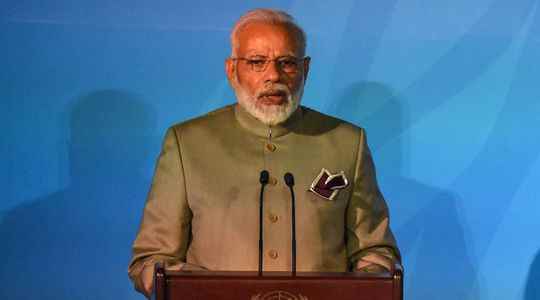A real noria! For several weeks, diplomats and foreign dignitaries have been flocking to New Delhi. The reason for this exceptional diplomatic ballet? Indian ambiguity vis-à-vis Moscow, which pushes Western leaders to come and pass a few messages to the head of government, Narendra Modi. On a visit in March, Japanese Prime Minister Fumio Kishida told his Indian counterpart that the Russian invasion required a clear response. In the process, the Australian Prime Minister, the Deputy National Security Advisor of the United States, Daleep Singh, the head of the British government, Boris Johnson, and the President of the European Commission, Ursula von der Leyen.
An ally of both Russia and the West, New Delhi has never explicitly condemned Moscow’s aggression. Caught between the two blocs, India is trying, somehow, to maintain a neutral position. Sign of this great diplomatic gap, Sergei Lavrov, the Russian Minister of Foreign Affairs, landed in the Indian capital on March 31, just hours after the departure of Liz Truss, his British counterpart! On this occasion, he welcomed the position of New Delhi, which, according to him, does not analyze this conflict “in a unilateral way”.
So far, attempts by the West to bend India have come to naught. On more than ten occasions, the country has abstained from the United Nations and still refuses to vote on resolutions critical of the Russian invasion. This line has remained essentially the same since the beginning of the conflict. New Delhi calls for “the immediate cessation of violence and an end to hostilities” and recalls that the world order is based on respect for international law and “respect for the territorial integrity and sovereignty of States”. In a perilous balancing act, India tries to show that it is impartial, without ever naming the Russian invasion. And continues to advocate the path of dialogue and diplomacy to end the conflict. The Indian Prime Minister also spoke with the Russian Presidents, Vladimir Putin, and Ukrainian Presidents, Volodymyr Zelensky.
In a hostile region, the impossible choice
“Russia’s aggression is unjustified, but India’s decision to refrain from condemning Russia is geopolitical,” writes Happymon Jacob, a professor at Jawaharlal Nehru University in New Delhi. which opposes it to a logic based on moral and ideological considerations.
Relations between India and Russia date back to the Cold War and Moscow continues to be New Delhi’s main arms supplier. About 85% of India’s arsenal is of Soviet and Russian origin, according to the Stimson Center. If India has sought in recent years to reduce this dependence by obtaining supplies from France or the United States, Russian military equipment nevertheless represented 46% of Indian imports between 2017 and 2021. India badly needs Moscow, especially as the Indian and Chinese armies have been at loggerheads since the deadly June 2020 clash along their disputed border in the Himalayas.
To counter the rise of China in the Indo-Pacific, the subcontinent has also moved closer to the United States. India is notably part of the Quad, this strategic alliance which aims to protect China, and brings together the United States, Japan and Australia. Hence its delicate position in the Russian-Ukrainian conflict. “It’s good to have friends, but China remains our challenge because of our geography,” said Manjeev Singh Puri, India’s former ambassador to the European Union, now associated with the Gateway think tank. House, in reference to the more than 3000 kilometers of border shared by the two Asian rivals.
Nor can India afford to alienate Russia in an already very hostile region, which also includes enemy brother Pakistan. And New Delhi fears that Moscow’s isolation on the international stage will strengthen its relationship with China. “The position of a country is where its interests are. Opposing Russia is not an option for India,” summarizes the diplomat.
Russian oil at a knockdown price
Nor is there any question of “linking the Ukrainian situation to trade issues”, said Subrahmanyam Jaishankar, the Indian Minister of Foreign Affairs, at the end of March. India, which depends more than 80% on imports for its hydrocarbon needs, has ordered at least 40 million barrels of Russian oil (at a reduced price) since the start of the war, twice as much as during of all of 2021, according to Reuters calculations. “But if you look at the figures, our total monthly purchases are probably less than what Europe buys in an afternoon,” the head of Indian diplomacy nevertheless told journalists in early April.
It is true that Russia supplies only a very small part of its oil to India. “It is unfair to ask a developing country facing serious economic difficulties and trying to recover from the impact of Covid-19 not to buy Russian oil at a discount, especially when some of those who criticize the “India continue to supply energy from Russia, at a reduced price or not”, also judges Happymon Jacob.
It prevents. Western pressure on India should not subside and everything leads us to believe that it will even increase. “Westerns understand India’s position but don’t want to accept it, that’s why they continue to keep up the pressure,” said Manjeev Singh Puri. For India, the long-term challenge is to successfully keep both Russia and the West on its side. A position that will be less and less easy to hold.
